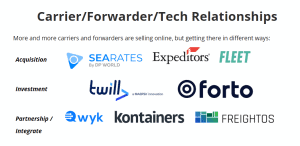A Broad Look at Logistics Technology with Eric Johnson, JOC
One of our pastimes at Freightos is bringing together people passionate about logistics technology.
With far too few forums for logistics technology insiders to connect, and COVID-19 putting in-person meet-ups on hold, we went looking for ways to scratch that logtech itch.
So we launched the Future of Freight, a new series of open discussions with key players from many different corners of the logistics technology landscape.
In these interviews we hit on some of the big topics impacting the industry and field questions from the insider audience to get insights on what matters to us the most. It’s by freight and tech speakers for freight tech fans, so we assume that everyone knows both what a FEU and an API are.
In last week’s inaugural episode we sat down with Eric Johnson, Senior Tech Editor at Journal of Commerce to get his take on some of the key questions on the direction technology is taking the industry.
Here are the cliff notes if you couldn’t make it:
Will freight become another platform economy?
Platform-based business models abound among the world’s leading companies – think Amazon, Facebook, Google, Airbnb, Apple – is freight headed in the same direction? Will platforms succeed in aggregating demand from millions of shippers?
Yes, and no.
According to Johnson, in freight there are still two competing forces: the pull toward the traditional, long sales cycle where shippers negotiate with carriers or forwarders for long-term agreements, and the software model (that has actually been at work for more than 30 years) looking for better, technology led ways to win customers.
And some on both sides – carriers/forwarders and BCOs – like it that way.
Some BCOs feel the best way to a good deal is through face-to-face negotiations and relationship building, and others are looking for the lowest-touch, least friction (often tech-powered) solution for freight.
He pointed out that more and more carriers and forwarders have direct online sales, but for the near future the market will be characterized by its stratification: some (mostly enterprise) shippers will still want freight to be a person-to-person business, and others (mostly SMBs) will be won by digital freight solutions.
Same goes for some of the big carriers’ moves into other parts of the supply chain (much to many freight forwarders’ chagrin).
There is a big enough variety of shippers that forwarders will still have expertise and services that provide value beyond procurement, such as understanding customer needs, first mile and last mile.
What’s affecting carrier and forwarder decisions for developments in the tech stack?
The ability to meet the customer at the point of engagement – be it through online quoting, booking, or ancillary services like customs or insurance – and make these things more self-serve for those who want it that way, is guiding which tech solutions are developed.
In this sense the industry is becoming more customer-centric, but again some BCOs are content to keep freight relationship-based.
APIs are already starting to feature in these solutions. The best method for leveraging the power of an API is to consider carefully what niche an API can serve – what type of service could never be provided or bundled before? – and build it accordingly. Savvy customers may then be able to apply those APIs in new and unexpected ways.
And who’s going to foot the bill for the cost of developing these technologies?
For a long time ocean carriers have been guilty of monetizing any new ease of service technologies. But Johnson believes in a world of Amazon et al., freight customers won’t accept fees for tech anymore. They’ll expect services to improve continually, and carriers and forwarders will need to fold tech costs into their pricing.
Amazon’s moving into logistics, how will this impact SMB importer growth?
Johnson doesn’t think Jeff Bezos or Jack Ma ever wanted to be in logistics.
Rather, they identified shipping as a prohibitive expense in their balance sheets and thought: can we do it better ourselves? And once the answer was ‘Yes,’ the next question was can we offer this service to our customers too?
But instead of considering whom these moves hurt, they should be considered for the structure they bring to the SMB world. Amazon and the like identified SMBs as a profitable segment that carriers and large forwarders had long actively avoided.
Now we’re seeing them trying to backtrack into those markets. And tech may give these logistics providers the ability to reach smaller customers that they really weren’t equipped to serve in the past.
Acquire, invest, or partner: which method will dominate freight tech in the next five years?
Here’s a point where COVID-19 may have another big impact.

Before the pandemic, talk was that there would be a big wave of tech acquisitions in the industry.
But with all the financial impact and uncertainty that the virus is causing, we may see more of a focus on partnerships. Logistics providers may choose to be more cautious, and have the flexibility of trying different solutions through partnerships for the time being, instead of acquiring or investing in just one service.
Thanks again to Eric for joining the conversation. Check out other episodes from our Future of Freight series here.



